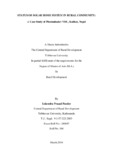Please use this identifier to cite or link to this item:
https://elibrary.tucl.edu.np/handle/123456789/2262| Title: | Status of Solar Home System in Rural Community: A Case Study of Phoimahadev Vdc, Kalikot, Nepal |
| Authors: | Pandey, Lokendra Prasad |
| Keywords: | socio-economic;Solar Energy |
| Issue Date: | 2016 |
| Publisher: | Department of Rural Development |
| Abstract: | Due to the remoteness and lack of adequate infrastructure development, most places of Karnali zone and adjoining districts have poor access to electricity. Moreover, extension of grid electricity in those areas is very expensive. Besides, the people living in these areas have very low income.Therefore, they could not afford for Solar Home System(SHS) and MicroHydro Power (MHP)making them bound mainly to rely on the kerosene lamp, “Jharo”(Pine wood rich in latex) and dry cell for lighting. Those traditional lighting systems affect environment surrounding them as well as their health adversely. Some organizations have been involved in disseminating different kinds of “Tuki” (Tuki in Nepali means lamp) running from the dry cell which were not tested and not guaranteed to run. Also, there is no assurance of the after sales services. This present research has made an attempt to find out the status of SHS in PhoimahadevVDC, interest of people to install SHS, types of benefits that they are gaining their socio-economic status and operational status of SHS. Likewise, annual income of SHS users and non-users, income sources of SHS users and non-users, various uses of SHS and energy consumption analysis of Phoimahadev VDC has also been studied. The data for the research have been collected from primary sources and secondary sources. There are 617 Households in Phoimahadev VDC and 149 households in ward no. 8 & 9. In the study area, 102 households have been benefited from solar energy. Among them fifty households were selected from users and 10 households from non-users as a sample using simple random sampling method. Altogether 60 respondents were selected for the study purpose.Structured questionnaires, semi-structured interview, observation and focus group discussion methods were used as tools for the data collection. On the basis of the collected qualitative and quantitative data, the analysis and interpretation is done. The finding shows that larger proportions of the respondents are male Brahman, Chhetri Thakuri and Dalit (users and non-users of SHS). Agriculture is predominant occupation of respondents but not the sufficient one in terms of income. Besides agriculture, labor, government job, small industry, business, service are the other occupation followed by the respondents. Almost half of the respondents could not meet the SHS cost from their annual savings. This indicates financial support package should be launched with SHS extension programs. Children are the main beneficiaries and improvement in study environment is the major gain. Better lighting has provided longer study time and facilitated guardians in coaching their school going children at night. SHS has also increased female members’ ability to accomplish more household chores because of better lighting and longer working hours. SHS has created the rural employment opportunity to the local community in repairing and maintaining SHS sets. Around half of the respondents perceive that local people are capable to run SHS repairing workshop in the village.“Jharo” and “Tuki”were commonly used lighting devices before installation of SHS. The study revealed that majority of the respondents have installed SHS for the sake of better lighting followed by kerosene expenditure saving and social prestige. Access to information is another important impact of SHS. Easy access to audio visual devices such as radio/cassettes, mobiles and TV have made the households better informed and enhanced their knowledge and skills.Installation of SHS has also improved indoor environment for most of the respondents. Smoke free environment has brought better health condition especially by reducing respiratory and eye related problems. However, few incidences of acid burning has emerged causing minor problems to family members, properties and their belongings. |
| URI: | http://elibrary.tucl.edu.np/handle/123456789/2262 |
| Appears in Collections: | Rural Development |
Files in This Item:
| File | Description | Size | Format | |
|---|---|---|---|---|
| cover.pdf | 274.4 kB | Adobe PDF |  View/Open | |
| chapter.pdf | 1.77 MB | Adobe PDF |  View/Open |
Items in DSpace are protected by copyright, with all rights reserved, unless otherwise indicated.
